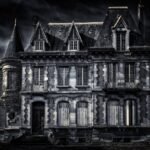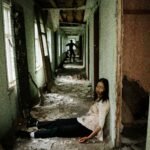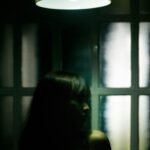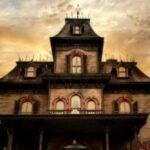
David lived alone in a small, weather-beaten house on the outskirts of Ridgewood, a town surrounded by dense forests and hidden away from the bustling world. His only companion was his dog, Max, a German Shepherd with sleek black fur and eyes that seemed to understand his every thought. Max had been with David for nearly eight years, through times of loneliness and heartache, and they were inseparable. David had no family to speak of, and he didn’t mind the isolation as long as he had Max by his side.
It was a cold, rainy evening when tragedy struck. The rain fell like a curtain, obscuring the road as David and Max walked along their usual path. Thunder rumbled overhead, and the air was thick with the scent of wet earth. They were almost home when a car came barreling down the narrow road, its headlights cutting through the downpour. David saw it too late—its tires skidded on the slick asphalt, and the driver lost control. Max, ever protective, lunged forward, shoving David out of the way just as the car swerved. But in doing so, he put himself directly in its path.
The car struck Max with a sickening thud, the sound mingling with David’s scream. The driver didn’t stop, disappearing into the night like a ghost. David rushed to Max’s side, cradling his lifeless body in his arms. His hands trembled as he felt the last warmth leave Max’s body, the rain mingling with his tears. Max’s eyes, once full of life, stared blankly at the dark sky.
David buried Max behind his house, under the large oak tree where they used to spend afternoons together. He dug the grave himself, each shovel of dirt feeling like it was tearing out a piece of his heart. He marked the grave with a simple wooden cross, his hands raw and blistered from the effort. After the burial, the house felt like a tomb. The warmth was gone, replaced by an unrelenting chill that seeped into his bones. The silence was deafening, broken only by the sound of the rain tapping against the windows.
For days, David wandered the empty halls, calling out for Max, hoping for an answer that never came. He couldn’t eat, couldn’t sleep, and the dark circles under his eyes grew deeper with each passing day. His grief was a constant, gnawing presence, like a shadow that clung to him wherever he went.
But then, strange things began to happen.
One night, as David lay in bed, staring at the ceiling, he heard a sound that made his blood run cold—the soft thumping of a tail against the wooden floor. He sat up, straining his ears, and the noise stopped. He dismissed it as his imagination, the product of a mind ravaged by grief. But the next morning, he found paw prints in the mud outside the back door, leading from the oak tree to the porch. The prints were fresh, the outline of each toe pad clear against the wet earth. David’s heart raced, his mind spinning with possibilities. But he told himself it was impossible—Max was gone, and no amount of wishful thinking could change that.
Yet, the incidents continued. At night, he would hear soft panting, like the sound Max used to make after a long run. He would wake up to find the front door ajar, as if something had nudged it open. One evening, while sitting by the fireplace, David felt a warmth settle beside him, just like the way Max used to curl up against his leg. He reached out, but his hand met only empty air. The presence, however, remained, a comforting weight against his side. David started to believe that Max hadn’t left him after all.
Weeks passed, and David grew accustomed to the spectral presence in his home. He began to talk to the empty air, sharing his thoughts and fears as if Max could hear him. And in those moments of quiet conversation, he felt a sense of peace he hadn’t known since the accident. He started to think that maybe, just maybe, Max was watching over him, protecting him from the shadows that lurked just beyond the edges of his loneliness.
But one dark night, that sense of comfort was shattered.
It was a moonless evening, the kind where the darkness seemed to swallow everything whole. David had just settled into bed when he heard a noise outside—a low hum, followed by the crunch of footsteps on gravel. He got up, peering through the window, and saw the shadows of four men moving through the darkness toward his house. Their faces were obscured by ski masks, and each carried a weapon—a crowbar, a knife, a rusted chain.
David’s heart pounded in his chest. He grabbed his phone, but there was no signal—Ridgewood was too far from the nearest tower. He tried to barricade the front door with a chair, but the men were already pounding against it, shouting threats that echoed through the silent night.
“Open up, old man, and maybe we’ll let you live!” one of them barked, his voice rough and mocking.
David backed away, his hands shaking, knowing he had no chance against them. He stumbled down the hallway, whispering to the shadows, “Max, if you’re here… I need you.”
Just as the dacoits broke through the door, a cold wind swept through the house, carrying with it the scent of wet fur and earth. The temperature plummeted, and the lights flickered wildly. The intruders hesitated, glancing around with unease as the air seemed to thicken, turning heavy and oppressive. One of them, a tall man with a scar running down his cheek, shone a flashlight into the darkness, and his beam caught something that made him freeze.
Standing in the hallway, halfway between shadow and light, was Max’s ghostly form. His eyes glowed a deep, unearthly blue, and his black fur shimmered like mist. His teeth were bared, lips pulled back in a snarl that dripped with malevolence. A low, guttural growl filled the air, resonating through the walls like the rumble of distant thunder.
The dacoits recoiled, their bravado faltering. “What the hell is that?!” one of them shouted, his voice high-pitched with fear. They backed away, stumbling over each other, but it was too late.
Max lunged at them with a speed that defied reality, his spectral body phasing through walls and furniture. He sank his ghostly teeth into the arm of the man with the crowbar, and though his form was ethereal, the man screamed as if being burned. The air filled with the smell of singed flesh, and a white mist seeped from the wound, freezing to the bone.
David watched from the shadows, his breath caught in his throat. The dacoits swung their weapons wildly, but their blows passed through Max like he was made of smoke. Yet, every time Max retaliated, they felt a pain so intense it brought them to their knees. One by one, the intruders tried to flee, scrambling for the front door, but Max blocked their path, his form shifting like a shadow, appearing and disappearing at will.
He cornered the scar-faced man last, pinning him against the wall with a snarl that rattled the windows. The man’s eyes rolled back, his body convulsing with cold as Max’s breath washed over him like a winter gale. He managed a final, desperate scream before collapsing, unconscious, his skin pale and frostbitten.
When the house finally fell silent, Max turned to David, his spectral eyes locking onto his. For a moment, David felt as though time had stopped, the world narrowing down to just him and his loyal companion. He reached out a hand, but before he could touch the ghostly form, Max faded into the shadows, dissolving into the darkness like a mist retreating before dawn.
David fell to his knees, sobbing with relief and gratitude. He crawled over to the unconscious dacoits, their breath shallow and their bodies cold, and tied them up with the ropes he kept in the garage. When the police arrived at dawn, they found four men huddled together on the porch, too terrified to speak, and a shattered door that opened into a house filled with an unexplainable chill.
After that night, Ridgewood buzzed with rumors of the haunted house on the outskirts of town, where a ghostly dog protected its master from all who would wish him harm. Some locals swore they could hear barking echoing through the trees on moonless nights, a warning to any who might think of trespassing.
David lived out his days in that old house, the ghostly presence of Max never far from his side. And though he never saw his spectral friend again, he felt him there—in the warmth that pressed against his leg when he sat by the fireplace, in the soft thud of a tail that seemed to resonate through the wooden floors, and in the peace that filled his heart whenever the darkness threatened to consume him.
David realized that true loyalty never dies. It lingers, like a shadow at dusk, like a breath on a cold morning, and sometimes, if you’re lucky enough, it comes back when you need it the most.


















































